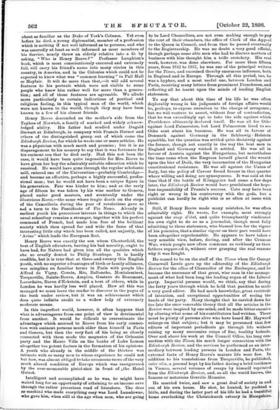Edinburgh Review, for which he wrote one or more articles.
He was a physician with much merit and promise; but it is no disparagement to his memory to say that it was fortunate for his eminent son that he died early. Had this not been the case, it would have been quite impossible for Mrs. Reeve to have given her boy the admirably suitable education which be received. He would have gone through the regular scholastic mill, entered one of the Universitiesâprobably Cambridgeâ and become an effective, perhaps a highly successful, profes- sional man ; but he would not have been a unique figure in his generation. Fate was kinder to him; and at the early age of fifteen he was taken by his wise mother to Geneva, placed under good masters, and eventually under the illustrious Rossi,âthe same whose tragic death on the steps of the Cancelleria during the year of revolutions gave so sad a turn to the Pontificate of Pio Nono. Already in earliest youth his precocious interest in things to which the usual schoolboy remains a stranger, together with his perfect command of French, bad made him free of tbe brilliant society which then spread far and wide the fame of that interesting little city which has been called, not unjustly, the Aviso ' which leads the European fleet.
Henry Reeve was exactly the son whom Chesterfield, the best of English educators, barring his bad morality, ought to have had, for Nature had given him all the qualities which she so cruelly denied to Philip Stanhope. It is hardly credible, but it is tree that at three-and-twenty this English youth, with no superior advantages of birth or family alliances, was mingling on familiar terms in Paris with people like Alfred de Vigny, Cousin, Rio, Ballanche, Montalembert, Tocqueville, Sainte-Beuve, Ampere, Gustave de Beaumont, Lacordaire, Baron d'Eckstein, and a host of others, while in London he was hardly leas well placed. How all this was managed we mast leave the reader to discover in the pages of the book under review, but it was an achievement which does quite infinite credit to a widow lady of extremely moderate means.
In this imperfect world, however, it often happens that what is advantageous from one point of view is detrimental from another. It would be difficult to overestimate the advantages which accrued to Reeve from his early connec- tion with eminent persons much older than himself in Paris and Geneva, but then the very fact of his being so closely connected with them made the magnates of the Orleanist party and the Haute Ville on the banks of Lake Leman altogether too potent factors in the formation of his opinions.
A. youth who already in the middle of the thirties was intimate with so many men to whose experience he could not but bow, was almost obliged to take erroneous views of the very much altered condition of Europe which was inaugurated by the ever-memorable pistol-shot in front of '.the Hotel Guizot.










































 Previous page
Previous page